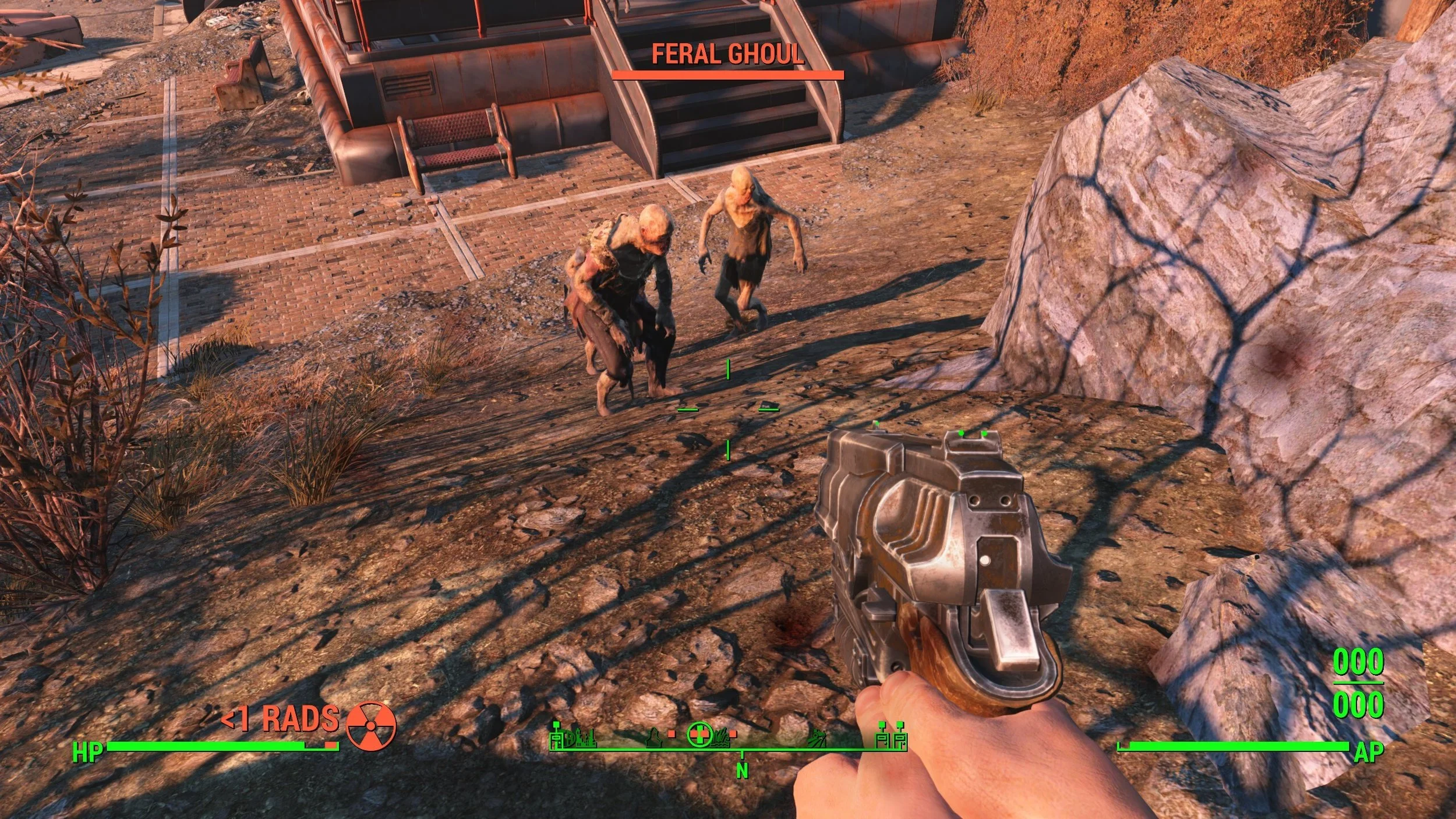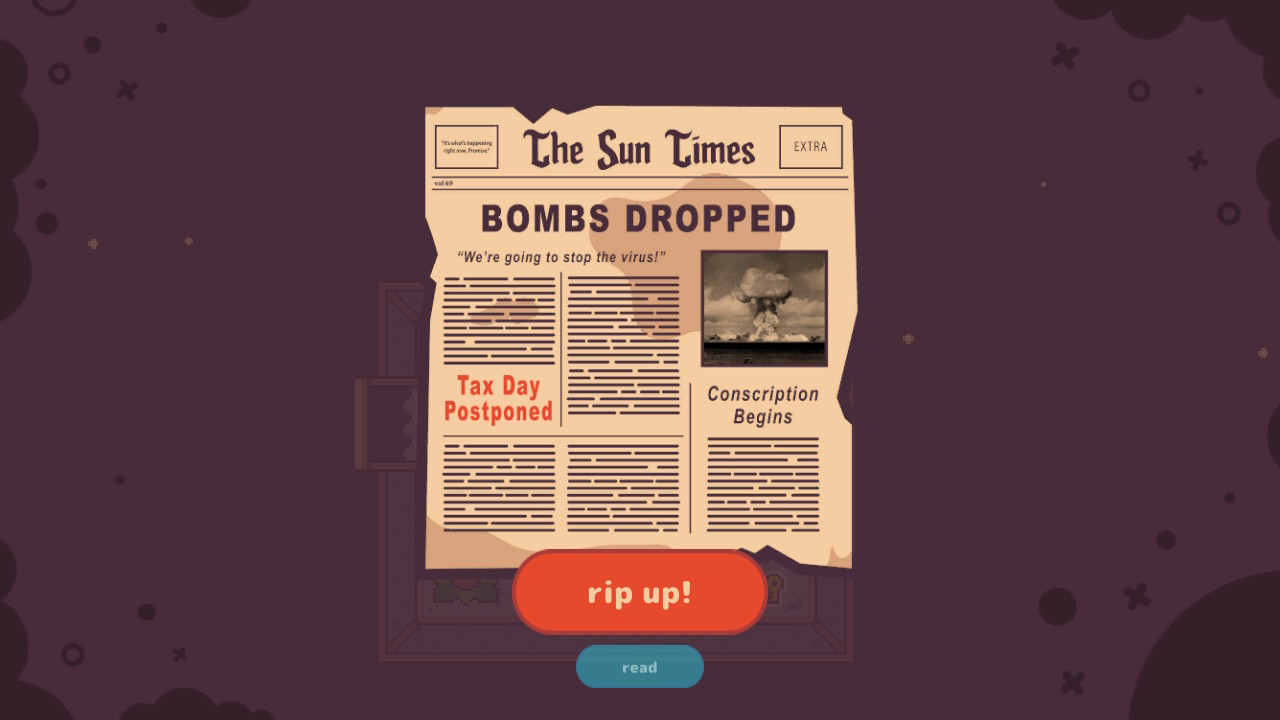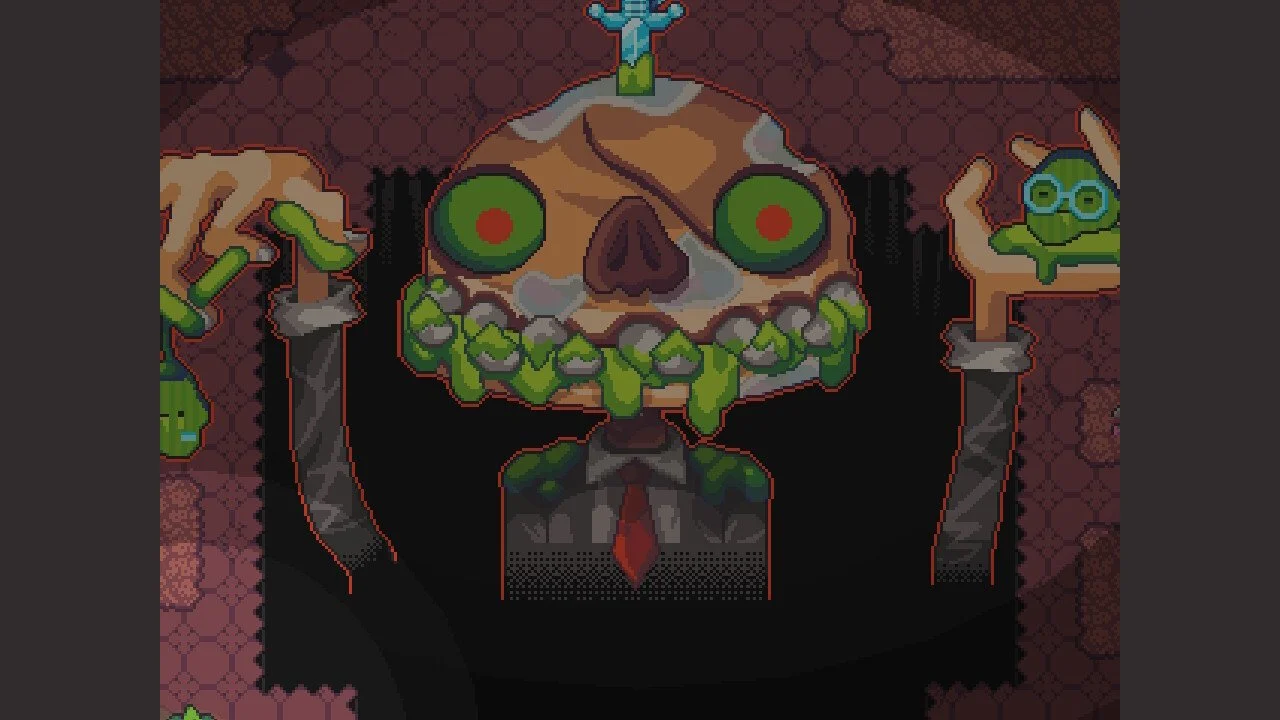Turnip Boy Causes a Nuclear Apocalypse!
Samantha Trzinski, Contributing Editor
Imagine a situation for a moment. A nuclear apocalypse has taken place. Humanity has been largely eradicated. Random scraps of humankind are all that remain of the time before Armageddon. A civilization was here before. A society. It is all gone now, though, and all that remains is lawlessness. There are the few who decide that they will rule the new world and use violence to put themselves into power. There are factions – some that accept outsiders, some that do not. As the player, you must make the moral decision of whom you will be. Will you be kind, considerate, and selfless? Will you put your needs before others? Will you be a bringer of chaos and disorder?
In the current moment, this description seems undoubtedly to describe the Fallout franchise. The games in this series take place in the midst or the wake of nuclear war, and the player must learn how to navigate the Wasteland. With the recent popularity of Amazon Prime’s Fallout series, it seems apt that the games are receiving renewed interest. It is nearly impossible to look anywhere online without seeing mention of Fallout, whether it be in reference to the games or the series. After all, where there is a nuclear bomb, there is fallout.
Feral ghouls in Fallout 4; image by the author.
The American poet Sara Teasdale considers the impact that nuclear war would have on the world in her poem “There Will Come Soft Rains.” This poem is melancholic yet demonstrates how such a war would go unremembered by those living in its wake:
“There will come soft rains and the smell of the ground,
And swallows circling with their shimmering sound;
And frogs in the pools singing at night,
And wild plum trees in tremulous white,
Robins will wear their feathery fire
Whistling their whims on a low fence-wire;
And not one will know of the war, not one
Will care at last when it is done.
Not one would mind, neither bird nor tree
If mankind perished utterly;
And Spring herself, when she woke at dawn,
Would scarcely know that we were gone.”
Throughout the twentieth century and into the current day, there has been a constant threat of global destruction. The atomic bomb has made the end of the world a thing of possibility, and it has been in the back of seemingly everyone’s minds for nearly a century now. The recent box office success of Oppenheimer, a film centered around the creation of the atomic bomb, for instance, attests to the pervasiveness of nuclear destruction. This fascination with the atomic bomb and nuclear devastation has seeped into every type of media, from movies to poetry to video games, including successful franchises like Fallout and recent “cute” games like Turnip Boy Commits Tax Evasion and Turnip Boy Robs a Bank.
These games are not alone in the nuclear Armageddon genre of video games, though. There have been dozens of games that take place in an irradiated world, such as Wasteland, S.T.A.L.K.E.R., and Metro Exodus. Many of these nuclear-war games are grim and gruff and center around the violence and catastrophe that occur when human civilization falls. They are decidedly dark, and the player knows this feature when they begin the game. What happens, though, when the player is not expecting a nuclear holocaust and the end of humanity?
Turnip Boy Commits Tax Evasion; image by the author.
This question is at the heart of Turnip Boy Commits Tax Evasion and its sequel Turnip Boy Robs a Bank. On the surface, these games appear cute, lighthearted, and silly. In them, you play as Turnip Boy, a sentient turnip, and go on an adventure where you meet various fruits and vegetables. In the initial game, Turnip Boy receives a tax bill from Mayor Onion, which he promptly tears apart. Mayor Onion then accuses Turnip Boy (rightly so) of tax evasion and sends him on various quests as penance. While on these quests, Turnip Boy finds numerous documents which he tears apart – gotta destroy those tax documents! This game’s art style is adorable, and its quests are comedic and ridiculous. As the player progresses, though, they find evidence that this cute world inhabited by sentient bipedal fruits and vegetables is actually a nuclear wasteland. Collectables throughout the game reveal this devastating truth, and the player learns that this cuteness is the unfortunate result of severe radiation. Evidently, humanity’s last-ditch effort to stop the spread of COVID-19 was with nuclear bombs. It seems that this approach worked – COVID-19 is not a fear in this world of fruits and vegetables. However, humanity also seems to be gone. Truly, “Not one would mind, neither bird nor tree / If mankind perished utterly,” as Teasdale feared.
In the game’s sequel, Turnip Boy continues his lawless behavior by switching from tax evasion to bank robbery. This game is certainly more violent with its varying weapons, though they range in severity from a bubble blower to a rocket launcher. This game takes place two days after the events of Turnip Boy Commits Tax Evasion. His defeat of Mayor Onion at the end of the first game ignites a war, which has left the once-civilized world of Veggieville in ruin. It may seem strange that so much occurs in just two days of time. However, two days is quite a long stretch in the life of a vegetable. In this war-stricken world, Turnip Boy teams up with the Pickled Gang to rob a bank owned by Stinky, a sentient bulb of garlic. This game functions differently than its predecessor. Rather than being an adventure game with some fighting mixed in, it is a randomized dungeon. Turnip Boy searches through the bank with its mysteriously changing elevators to find the mother lode, an exorbitant amount of money hidden in an undisclosed location.
The nuclear holocaust is easy to forget in this game as the player explores the vaults and rooms of a bank. The bank is beautiful and labyrinthian, and it is hard to believe that it exists in a post-nuclear war world. However, the player eventually finds a “creepy portrait” of a man – a human – who seems to be the previous owner of the bank. This portrait is unsettling, to say the least. It is made worse when the player meets this previous owner in the depths of the bank. This man has transformed into a monstrosity from the nuclear bombs’ immense radiation. His face has partially melted and fused with the sandwich he was eating when the bombs fell. When he is introduced as “Uncle Rigsby: the true owner,” the player is painfully reminded that this game is not just some adorable adventure – it is a post-apocalyptic nightmare.
Someone help Uncle Rigsby. From Turnip Boy Robs a Bank; image by the author.
So, we return to our question: what happens when the player is not expecting a game to be about nuclear Armageddon? This subversion of expectations jolts the player and causes a massive paradigm shift. It forces the player to reconsider the trials and tribulations of Turnip Boy, which is a ridiculous thing to say. However, this realization of the game’s true meaning recasts it in the horror genre. It taking place in a post-apocalyptic nuclear wasteland rattles the player and transforms the comedic elements into sad remnants of human society.
One of these unsettling reminders of humanity appears in the dark docks, where Turnip Boy encounters strange, goblin-like creatures. After helping one of the creatures named Gregg with a side quest, Turnip Boy learns that these creatures were actually at one point humans. They were vegetarians who were preparing for live-action roleplaying when the bombs fell. They mutated in the fallout and transformed into the gray-skinned, pointy-eared creatures that Turnip Boy finds among radioactive waste. These creatures seem somewhat similar to the ghouls in Fallout – humans who were horribly mutated by the bombs’ radiation and turned into monstrosities that vaguely resemble what they once were.
Of course, the art style is not the unsettling and terrifying about the Turnip Boy games. Its cute 2D design detracts from the monstrosities and horrors that the player encounters, such as these mutated humans and Uncle Rigsby. This juxtaposition of adorable game play and horrific exposition, humor and sorrow, transform the game into something more than the silly adventure game it markets itself as. It should be considered along the lines of the Fallout franchise as a critique of humanity. It demonstrates the potential consequences of nuclear war and the selfishness of capitalist leaders, and it explores the violence and anarchy to which humanity reverts when order and government are dissolved.
Though written long before the threat of nuclear war, Percy Bysshe Shelley’s poem “Ozymandias” seems apt when thinking about these post-apocalyptic games. This poem imagines an unnamed traveler, who tells the speaker of the poem about the remains of a statue that he found in the desert. He says:
“I met a traveller from an antique land,
Who said—“Two vast and trunkless legs of stone
Stand in the desert. . . . Near them, on the sand,
Half sunk a shattered visage lies, whose frown,
And wrinkled lip, and sneer of cold command,
Tell that its sculptor well those passions read
Which yet survive, stamped on these lifeless things,
The hand that mocked them, and the heart that fed;
And on the pedestal, these words appear:
My name is Ozymandias, King of Kings;
Look on my Works, ye Mighty, and despair!
Nothing beside remains. Round the decay
Of that colossal Wreck, boundless and bare
The lone and level sands stretch far away.””
Essentially, the traveler found a statue of Ozymandias (or Ramses II, former pharaoh of Egypt) that lauds its nearby “works.” Ironically, though, all that surrounds this broken and dilapidated statue is endlessly bare sand. The works have been destroyed and lost to time. Similarly, in games like the Fallout and Turnip Boy franchises, all that remains of humankind are such arrogant claims about humanity’s power. In Fallout, though, the player is prepared for such a melancholic perspective on humanity’s future. They are warned about the game’s focus from the beginning. With Turnip Boy, however, there is no such warning. The player is lulled into a false sense of security, and their understanding of the game is devastated when they learn its truth. Fallout offers hope for the future of humanity; Turnip Boy rejects it.




